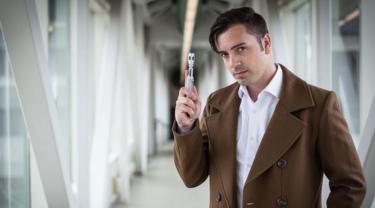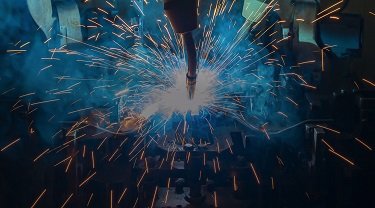Jamie Fraser’s coat in the hit TV series Outlander is the latest replica apparel boosting exports for AbbyShot, the Newfoundland-based company that designs and manufactures clothing and accessories styled after costuming in TV series, movies, computer games and anime series.
In addition to robust online sales of licensed Outlander merchandise, in 2017 AbbyShot concluded an arrangement with Historic Environment Scotland to sell the themed clothing at many of its sites like Edinburgh Castle and Blackness Castle (where parts of the time-travel saga were filmed). Apart from replicas of the coat worn by Jamie Fraser, tourists and costume enthusiasts can also buy Claire Fraser’s gloves and riding coat or Dougal MacKenzie’s Scottish Bonnet.
Starting out as an exporter
Although AbbyShot founder Bonnie Edgecombe insists “it’s not rocket science,” the deals have undoubtedly become more complex since 2002 when she agreed to sew a replica of the coat worn by Keanu Reeves in The Matrix. She was running a home-sewing business when the order for the single Matrix coat quickly grew to six coats. By chance Edgecombe found herself producing clothing for the cosplay market where enthusiasts dress up as characters from movies, anime series, computer games or TV shows.
“So we just said, ‘Okay, let’s jump on this train, and see how it’s going to go,’” she recalls.
Working with major companies
Fifteen years later the small business is still growing as it manufactures and exports products to more than 50 countries and has licensing agreements with companies like BBC Worldwide, ABC/Disney, Sony Pictures, 20th Century Fox and NBC Universal.
One of the premier lines manufactured by AbbyShot is the range of coats worn over the decades by Doctor Who, the time lord whose adventures created a cult following for the British science fiction TV series. Edgecombe says the coat worn by the 10th Doctor – played by David Tennant – is the company’s top selling item.
The initiative to make the Doctor Who coats was a suggestion from one of her staff members.
“So we approached the BBC and they said they’d consider it,” she says. “We took a small contract with the BBC, had it looked over by our lawyers. We thought we were OK, and we were.”
Edgecombe says one of her most significant learnings dates back to this contract.
Licensing lessons
“I have clung to two words for 15 years: clear and concise,” she says. “If I’m not clear and concise, I don’t get what I want, or the outcome is different to what we perceived, so we’re very cautious about wording.”
But Edgecombe didn’t make the first move for the Outlander licensing, Sony contacted her after finding the company profile on LinkedIn. She says AbbyShot’s LinkedIn profile communicated the company’s attention to detail on the screen-accurate clothing and its experience in licensing agreements – an attractive proposition for Sony.
“Licensing is not rocket science, but it takes a lot of administrative work, learning and relationship building,” she adds.
Getting boots on the ground
To continue to grow the company AbbyShot has had to make some brave decisions. While it ships its product around the world, its main markets are the U.S. and the U.K., so to reduce shipping costs for its customers AbbyShot moved most of its inventory to warehouses in North Carolina and Northern Ireland. The company now also manufactures some of its apparel in Glasgow, Scotland.
Export insights with Bonnie Edgecombe
Looking back, what do you know now that you wish you knew when you started?
The ‘don’t know what you don’t know’ is very important. There were lots of things we had no idea we were going to face, so it’s the ‘don’t know.’ The hardest thing was probably learning about moving product across borders.
You just have to be persistent in your learning. We would reach out to people. We would stop and say, ‘Who is doing this in St. John’s right now? Who can we talk to? Or who can we talk to in another country?’
Where do you see your growth opportunities?
Our products are driven by the demand so we’re always broadening our product list.
And I think manufacturing in the U.K. is going to make a big difference for us, plus CETA may play a role in some of the success of that, because we’ll be able to ship into Canada without the duty.
What have you learned about manufacturing in other countries?
We recently had an issue with a manufacturer. We thought we had done everything right – factory audited, inspection agency checked goods on completion – however, once the goods had been shipped we found there was a quality issue. It’s been quite the lesson but we chose to rise above it.
What we learned is, you have to have your eyes on your whole supply chain. You have to be there, present. It’s not easy to get to all countries from Newfoundland, but with our manufacturing in the U.K. now we will be able to monitor our supply chain more closely.





